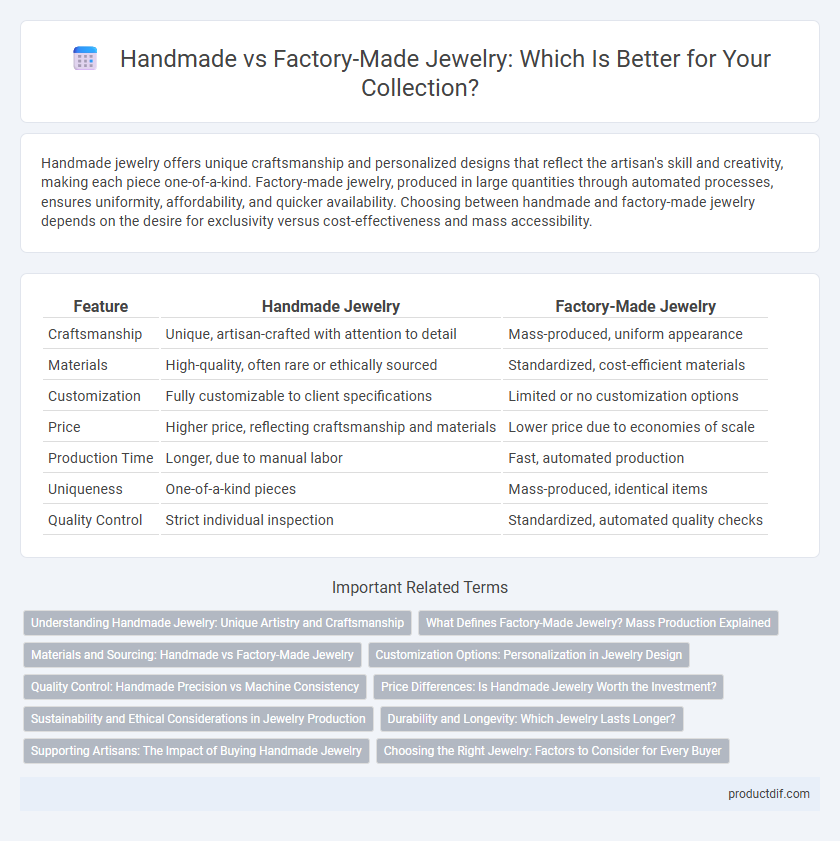Handmade jewelry offers unique craftsmanship and personalized designs that reflect the artisan's skill and creativity, making each piece one-of-a-kind. Factory-made jewelry, produced in large quantities through automated processes, ensures uniformity, affordability, and quicker availability. Choosing between handmade and factory-made jewelry depends on the desire for exclusivity versus cost-effectiveness and mass accessibility.
Table of Comparison
| Feature | Handmade Jewelry | Factory-Made Jewelry |
|---|---|---|
| Craftsmanship | Unique, artisan-crafted with attention to detail | Mass-produced, uniform appearance |
| Materials | High-quality, often rare or ethically sourced | Standardized, cost-efficient materials |
| Customization | Fully customizable to client specifications | Limited or no customization options |
| Price | Higher price, reflecting craftsmanship and materials | Lower price due to economies of scale |
| Production Time | Longer, due to manual labor | Fast, automated production |
| Uniqueness | One-of-a-kind pieces | Mass-produced, identical items |
| Quality Control | Strict individual inspection | Standardized, automated quality checks |
Understanding Handmade Jewelry: Unique Artistry and Craftsmanship
Handmade jewelry showcases unique artistry through meticulous craftsmanship, resulting in one-of-a-kind pieces that reflect the artisan's creativity and attention to detail. Each design is carefully crafted by skilled hands, often using traditional techniques that enhance the jewelry's intrinsic value and individuality. Unlike factory-made jewelry, handmade pieces emphasize quality and personalization, making them highly sought after for their distinct character and timeless appeal.
What Defines Factory-Made Jewelry? Mass Production Explained
Factory-made jewelry is characterized by mass production techniques that utilize machinery and standardized processes to create large quantities of identical pieces quickly and efficiently. These items often prioritize affordability and consistency, benefiting from economies of scale and automated assembly lines. Materials are commonly sourced in bulk, which can affect the uniqueness and craftsmanship seen in handmade alternatives.
Materials and Sourcing: Handmade vs Factory-Made Jewelry
Handmade jewelry often features ethically sourced, high-quality materials such as recycled metals and natural gemstones, ensuring uniqueness and sustainability. Factory-made jewelry typically relies on mass-produced components and synthetic materials to reduce costs and increase uniformity. The choice of materials and sourcing directly impacts the environmental footprint and craftsmanship authenticity in both handmade and factory-made jewelry.
Customization Options: Personalization in Jewelry Design
Handmade jewelry offers extensive customization options, allowing artisans to incorporate unique designs, gemstones, and engravings tailored specifically to individual preferences. Factory-made jewelry typically follows standardized templates, limiting personalization and resulting in more uniform pieces. Personalization in handmade jewelry enhances sentimental value and uniqueness, making each item a meaningful expression of personal style.
Quality Control: Handmade Precision vs Machine Consistency
Handmade jewelry offers meticulous quality control with skilled artisans ensuring each piece is unique and crafted to perfection. Factory-made jewelry relies on machine consistency for uniformity, enabling large-scale production with standardized finishes. The choice between handmade precision and factory uniformity depends on the value placed on individual craftsmanship versus mass-produced reliability.
Price Differences: Is Handmade Jewelry Worth the Investment?
Handmade jewelry often commands higher prices due to the craftsmanship, unique design, and time-intensive techniques involved, contrasting with the mass production and lower costs of factory-made jewelry. The value of handmade pieces lies in their exclusivity, quality of materials, and artisanal detail, which can justify the investment for collectors and those seeking personalized expression. Factory-made jewelry offers affordability and uniformity, but handmade designs provide durability and distinctiveness that often appreciate in emotional and monetary worth over time.
Sustainability and Ethical Considerations in Jewelry Production
Handmade jewelry often prioritizes sustainability by using recycled metals and ethically sourced gemstones, reducing environmental impact compared to factory-made pieces that may rely on mass production and non-transparent supply chains. Artisans typically support fair labor practices, ensuring workers receive fair wages and work in safe conditions, while factory-made jewelry can involve exploitative labor in low-cost manufacturing hubs. Choosing handmade jewelry promotes ethical consumption by valuing craftsmanship, minimizing waste, and encouraging responsible resource use throughout the production process.
Durability and Longevity: Which Jewelry Lasts Longer?
Handmade jewelry typically exhibits superior durability and longevity due to meticulous craftsmanship and the use of high-quality materials selected individually by artisans. Factory-made jewelry often sacrifices durability for mass production efficiency, resulting in weaker settings and lower-quality metals that may tarnish or break more quickly. The personalized attention and traditional techniques employed in handmade pieces ensure they withstand wear and environmental factors better, offering lasting beauty over time.
Supporting Artisans: The Impact of Buying Handmade Jewelry
Purchasing handmade jewelry directly supports skilled artisans by preserving traditional craftsmanship and promoting sustainable work practices. Handmade pieces often embody unique designs and cultural heritage that factory-made jewelry cannot replicate, fostering economic empowerment in local communities. This conscious consumer choice contributes to a more ethical jewelry industry with reduced environmental impact compared to mass-produced alternatives.
Choosing the Right Jewelry: Factors to Consider for Every Buyer
Choosing the right jewelry involves evaluating craftsmanship, material quality, and uniqueness, with handmade jewelry offering personalized designs and superior artisan skill, while factory-made pieces provide consistency and affordability. Consider factors such as durability, customization options, and ethical sourcing to align purchases with personal values and style preferences. Buyers should also weigh the intended use, occasion, and maintenance requirements to ensure long-lasting satisfaction with their jewelry investment.
Handmade Jewelry vs Factory-Made Jewelry Infographic

 productdif.com
productdif.com